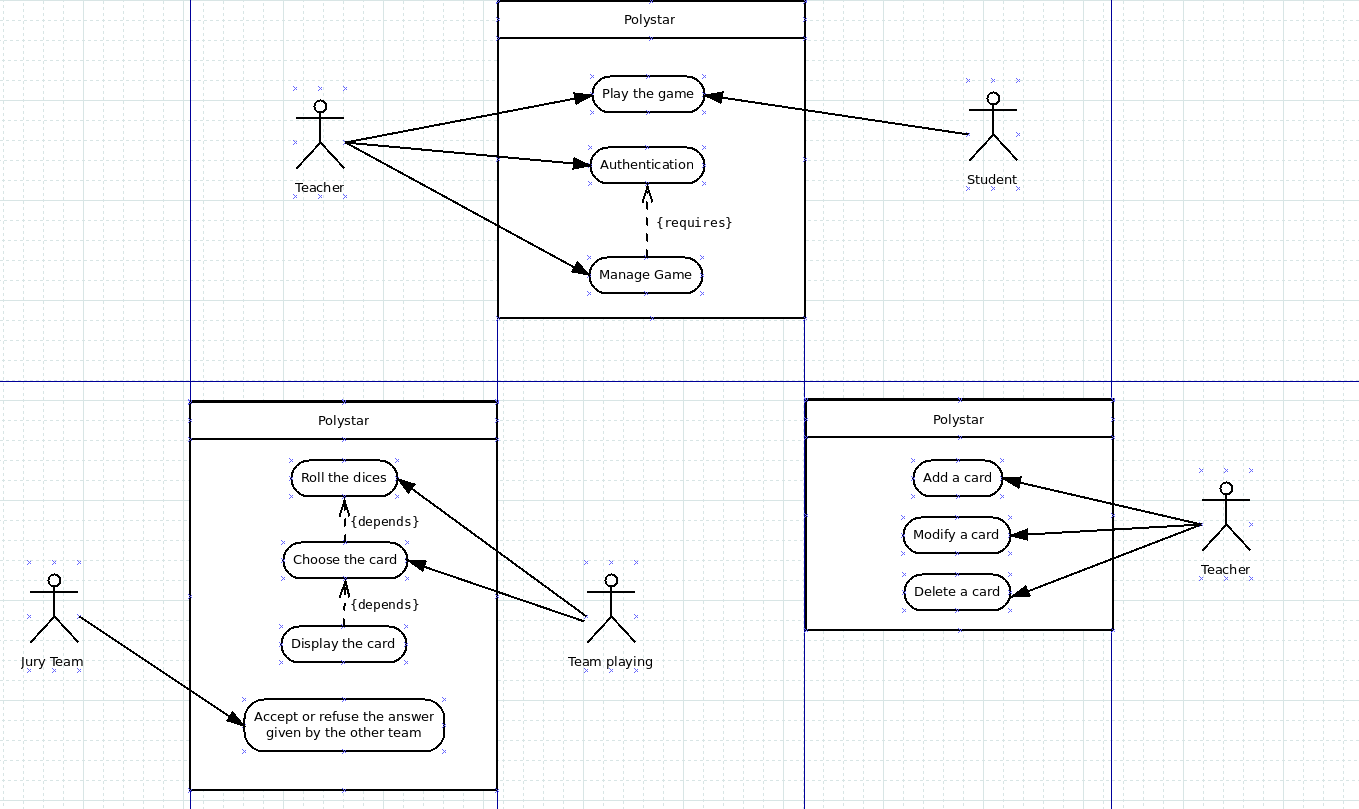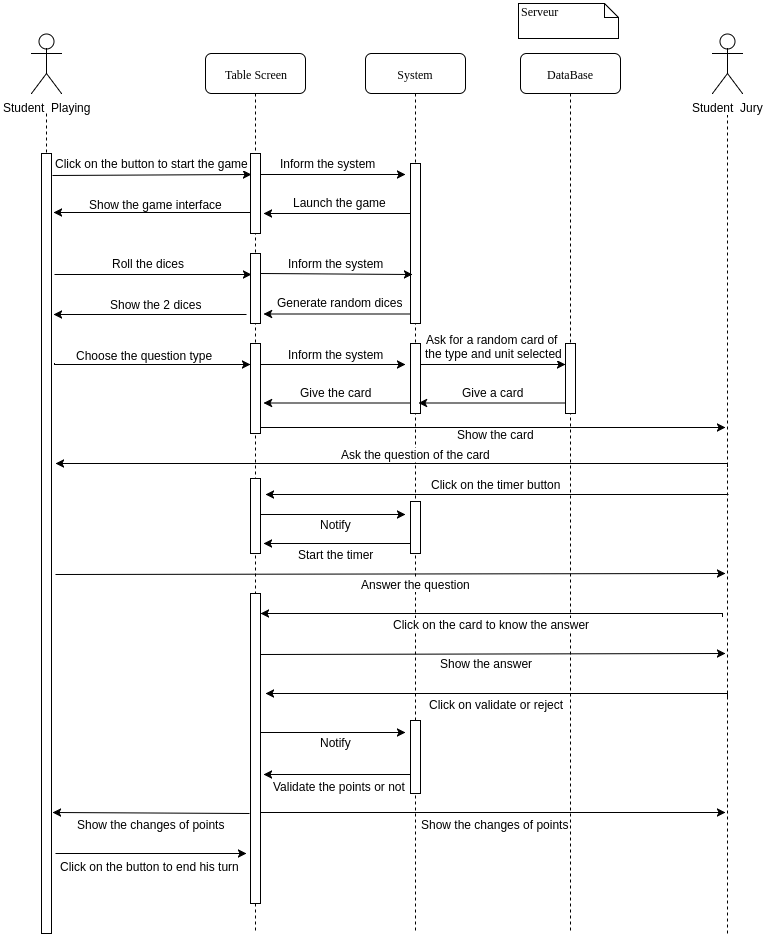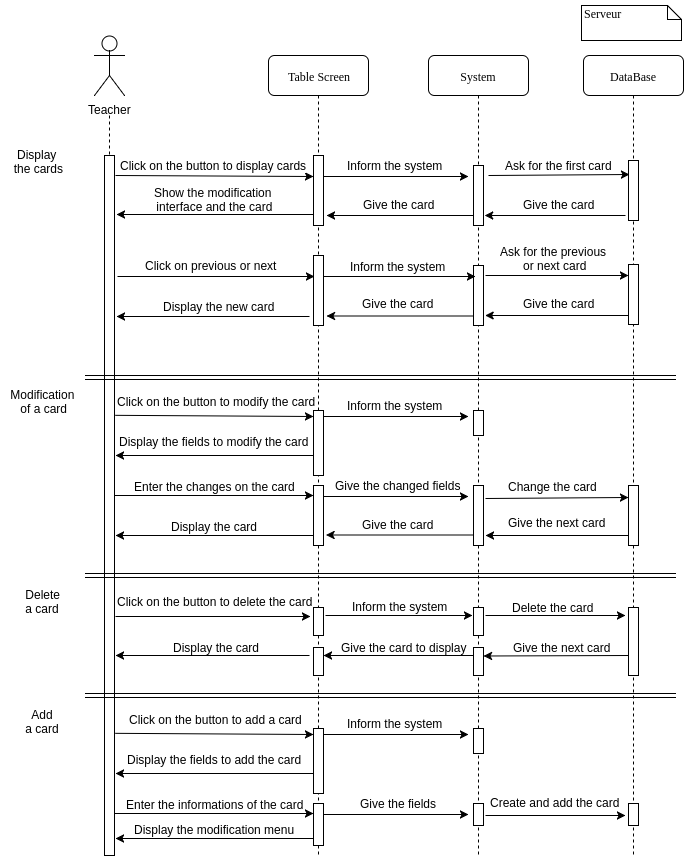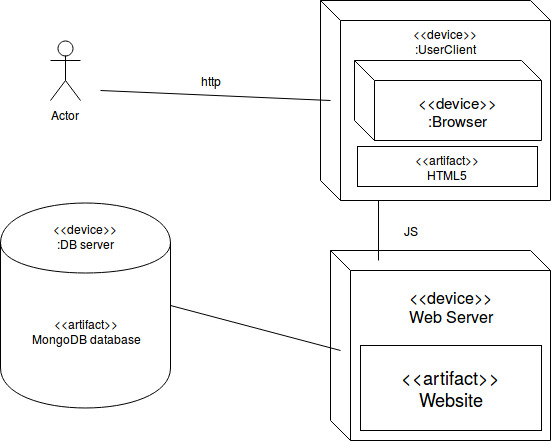Difference between revisions of "RICM4 2017 2018 - SeriousGame Polystar /UML"
Tim.Lepage (talk | contribs) |
|||
| (18 intermediate revisions by 2 users not shown) | |||
| Line 1: | Line 1: | ||
| − | + | = Use case = |
|
| − | '''Cas n°1''' |
||
| − | Cas d'utilisation : Jouer une partie |
||
| + | == Case n ° 1 == |
||
| − | Description : Les joueurs jouent une partie et le teacher supervise la partie |
||
| − | Acteur : Joueurs et Teacher |
||
| − | Parties prenantes et leurs intérêts : - Joueurs, objectif : gagner la partie |
||
| − | - Teacher, objectif : superviser la partie |
||
| − | Pré-conditions : Suffisamment de joueurs sont réunis pour jouer et lancent la partie |
||
| − | Scénario nominal : |
||
| − | Le système affiche le menu |
||
| − | Les joueurs sélectionnent le type de partie (unit et langue) |
||
| − | Le système affiche la page de jeu |
||
| − | Les joueurs jouent au jeu |
||
| − | Les joueurs finissent la partie |
||
| − | Les scénarios alternatifs : |
||
| − | Les joueurs quittent le jeu avant la fin |
||
| − | Fin : scénarios d ou e selon décision des utilisateurs |
||
| − | ''' |
+ | '''Use case:''' Play a game |
| + | |||
| − | Cas d'utilisation : Modifier le jeu |
||
| − | Description |
+ | '''Description:''' Players play a game and the teacher supervises the game |
| + | |||
| − | Acteur : Teacher |
||
| + | '''Actor:''' Players and Teacher |
||
| − | Parties prenantes et leurs intérêts : - Teacher, objectif : modifier le jeu |
||
| + | |||
| − | Pré-conditions : Authentification par un mot de passe |
||
| + | '''Stakeholders and their interests:''' |
||
| − | Scénario nominal: |
||
| + | |||
| − | Le système affiche le menu |
||
| + | - Players, goal: win the game |
||
| − | Le Teacher sélectionne “modify” |
||
| + | |||
| − | Le système affiche le système d’authentification |
||
| − | + | - Teacher, goal: supervise the game |
|
| + | |||
| − | Le système affiche les options de modification |
||
| + | '''Pre-conditions:''' Enough players are gathered to play and throw the game |
||
| − | Le Teacher modifie le jeu |
||
| + | |||
| − | Le système demande confirmation de la modification |
||
| + | '''Nominal scenario:''' |
||
| − | La modification est prise en compte par le système |
||
| + | |||
| − | Les scénarios alternatifs: |
||
| + | - The system displays the menu |
||
| − | Le Teacher ne s’identifie pas |
||
| + | |||
| − | Le Teacher quitte l’écran de modification |
||
| + | - Players select the type of game (unit and language) |
||
| − | Le Teacher ne valide pas les modifications |
||
| + | |||
| − | Fin: scénarios c, e, g ou h selon les décisions de l’utilisateur |
||
| + | - The system displays the game page |
||
| + | |||
| + | - Players play the game |
||
| + | |||
| + | - Players finish the game |
||
| + | |||
| + | '''Alternative scenarios:''' |
||
| + | - Players leave the game early |
||
| + | |||
| + | '''End:''' scenarios d or e according to user's decision |
||
| + | |||
| + | |||
| + | == Case n ° 2 == |
||
| + | |||
| + | |||
| + | '''Use case:''' Edit game |
||
| + | |||
| + | '''Description:''' The Teacher modifies the game by deleting / adding / modifying cards |
||
| + | |||
| + | '''Actor:''' Teacher |
||
| + | |||
| + | '''Stakeholders and their interests:''' - Teacher, goal: modify the game |
||
| + | |||
| + | '''Pre-conditions:''' Authentication with a password |
||
| + | |||
| + | '''Nominal scenario:''' |
||
| + | |||
| + | - The system displays the menu |
||
| + | |||
| + | - Teacher selects "modify" |
||
| + | |||
| + | - The system displays the authentication system |
||
| + | |||
| + | - The Teacher identifies himself |
||
| + | |||
| + | - The system displays modification options |
||
| + | |||
| + | - The teacher modifies the game |
||
| + | |||
| + | - The system requests confirmation of the change |
||
| + | |||
| + | - The modification is taken into account by the system |
||
| + | |||
| + | '''Alternative scenarios:''' |
||
| + | |||
| + | - Teacher does not identify himself |
||
| + | |||
| + | - The Teacher exits the edit screen |
||
| + | |||
| + | - Teacher does not validate changes |
||
| + | |||
| + | '''End:''' scenarios c, e, g or h according to the user's decisions |
||
| + | |||
| + | =UML Diagram= |
||
| + | [[File:Polystar_usage_diagram.png]] |
||
| + | |||
| + | =Sequence Diagram= |
||
| + | The sequence diagram bellow depicts the first turn of the game. |
||
| + | |||
| + | [[File:Polystar_game_diagram.png]] |
||
| + | |||
| + | The following sequence diagram depicts the different ways to modifiy the collection of cards. |
||
| + | |||
| + | [[File:Polystar_modification_diagram.png]] |
||
| + | |||
| + | =Deployment Diagram= |
||
| + | |||
| + | [[File: DeploymentDiagram_Polystar.jpg]] |
||
Latest revision as of 14:15, 4 April 2018
Use case
Case n ° 1
Use case: Play a game
Description: Players play a game and the teacher supervises the game
Actor: Players and Teacher
Stakeholders and their interests:
- Players, goal: win the game
- Teacher, goal: supervise the game
Pre-conditions: Enough players are gathered to play and throw the game
Nominal scenario:
- The system displays the menu
- Players select the type of game (unit and language)
- The system displays the game page
- Players play the game
- Players finish the game
Alternative scenarios: - Players leave the game early
End: scenarios d or e according to user's decision
Case n ° 2
Use case: Edit game
Description: The Teacher modifies the game by deleting / adding / modifying cards
Actor: Teacher
Stakeholders and their interests: - Teacher, goal: modify the game
Pre-conditions: Authentication with a password
Nominal scenario:
- The system displays the menu
- Teacher selects "modify"
- The system displays the authentication system
- The Teacher identifies himself
- The system displays modification options
- The teacher modifies the game
- The system requests confirmation of the change
- The modification is taken into account by the system
Alternative scenarios:
- Teacher does not identify himself
- The Teacher exits the edit screen
- Teacher does not validate changes
End: scenarios c, e, g or h according to the user's decisions
UML Diagram
Sequence Diagram
The sequence diagram bellow depicts the first turn of the game.
The following sequence diagram depicts the different ways to modifiy the collection of cards.



